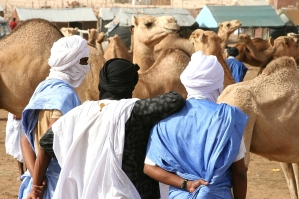
Officials in Mauritania have released all Christians arrested after a video of a baptism ceremony in November prompted Muslims to call for their punishment, Christian leaders in the region said.
The Christians do not appear to have been charged with any crime, the Christian leaders indicated.
“They have been asked to go home and believe what they want, but in private and discreetly,” a Christian leader in the region told Christian Daily International. “It seems that our brothers have more to fear from the Islamists than from their government. Thank God for this happy ending.”
At least 15 and possibly as many as 18 Christians were arrested along with their families, and the regional leader said that by Dec. 18 they had all been released. There is no law against evangelism in the northwest African country, though officials ban any public expression of faith except Islam.
At least three of the Christians were initially arrested on or shortly before Nov. 30 in Selibaby, more than 600 kilometers (373 miles) south of the capital city of Nouakchott, according to Spanish news service EFE. The arrests stemmed from protests calling for Christians to be killed after a video of a baptism ceremony appeared in social media, according to Christian leaders in the region.
Only foreigners are allowed to hold non-Muslim religious services in Mauritania, and it is illegal for citizens to attend, according to the U.S State Department’s latest International Religious Freedom Report (2022). While Mauritanians are thus prohibited from holding church services, the government does not usually prevent non-Islamic groups from holding religious gatherings in private spaces, according to the report.
Though there is no law against evangelism in Mauritania, officials nevertheless forbid non-Muslims from “proselytizing,” according to the State Department report.
Apostasy, or leaving Islam, is punishable by death in Mauritania, where the population is 98 percent Sunni Muslim, 1 percent Shia Muslim and the constitution designates Islam as the sole religion of the citizenry and state. The estimated 11,000 Christians in the country of 4.9 million people make up 0.2 percent of the population, according to Open Doors.
Mauritania’s laws and legal procedures derive from a mix of French civil law and sharia (Islamic law), but there have been calls from the public for increased application of the country’s sharia-based criminal code, according to the State Department’s 2022 religious freedom report.
“The law prohibits apostasy and blasphemy,” the report states. “The criminal code mandates a death sentence for any Muslim convicted of apostasy or blasphemy, but the government has never applied capital punishment for apostasy or blasphemy.”
Faith-based Non-Governmental Organizations must refrain from proselytizing or otherwise promoting any religion other than Islam. While the government typically allows private non-Islamic worship, technically the government must pre-approve all group meetings, “including non-Islamic religious gatherings and those held in private homes,” according to the report.
Possession of non-Islamic religious materials remained legal, although the government continued to prohibit their printing and distribution, it adds.
Although Mauritania is a party to the International Covenant on Civil and Political Rights (ICCPR), which provides everyone the “freedom to have or to adopt a religion or belief” of their choice, the government continued to ban any public expression of religion except that of Islam, according to the religious freedom report.
“Authorized churches were able to conduct services within their premises but could not proselytize,” the report states. “An unofficial government requirement restricted non-Islamic worship to the few recognized Christian churches.”
Mauritania ranked 20th on Open Doors 2023 World Watch List of the countries where it is most difficult to be a Christian.





